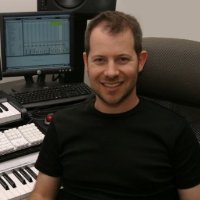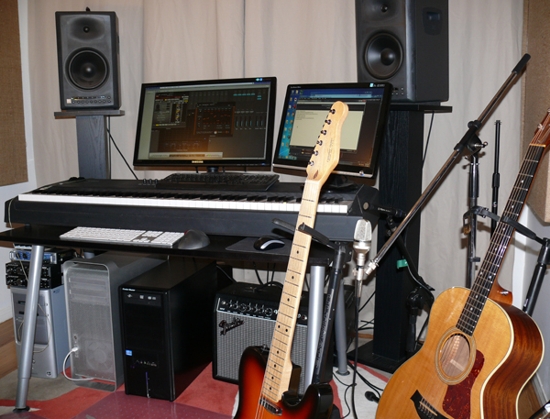Artist interview: Mike Raznick
Artist interview: Mike Raznick
 Mike Raznick (http://www.mikeraznick.com) is an award-winning composer/producer who's work has been featured in video games, feature length films, short films and Hollywood theatrical trailers. His partial client list includes companies such as Disney, Zynga, Ubisoft, HBO, MTV, CBS, ... to name but a few. We asked him a few questions:
Mike Raznick (http://www.mikeraznick.com) is an award-winning composer/producer who's work has been featured in video games, feature length films, short films and Hollywood theatrical trailers. His partial client list includes companies such as Disney, Zynga, Ubisoft, HBO, MTV, CBS, ... to name but a few. We asked him a few questions:
SampleSumo: Hi Mike, you have quite an impressive list of references on your bio, ranging from Zynga over CBS, to the Super Bowl and then some... How did you get into music in the first place? And how did you end up working with these big names?
Mike: First of all, thanks for the opportunity to speak with you guys! I grew up in San Francisco and was heavily exposed to music throughout my childhood. My mother and father are both huge fans of opera, symphonic music and theater and they made every effort to expose my brother and I to as much of it as we could digest. Additionally, my mother was a classical pianist, vocalist, actress and theater director. I know she experienced a lot of enjoyment out of her involvement in music and art and she had a great enthusiasm toward exposing us to it as well. She started me out in music lessons when I was six years old. Within a few years, I joined the San Francisco Children's Opera and later the San Francisco Boys Chorus, with whom I performed hundreds of concerts by the time I was twelve. During this same period, I discovered the Beatles and was completely blown away by their music. I didn't pay much attention to their lyrics at the time, but found myself drawn to the musical elements and colors that were presented in their arrangements. I remember my brother and I collected almost every single one of their records over a three-year period. I must have had a new favorite Beatles song almost every few weeks. Anyway, fast forward, I was 16-years old when I decided on a whim that I was going to learn how to play the guitar. I taught myself using a classical guitar book we had in the house, and I never really looked back. I knew (and tried to ignore for a time) that I wanted to go into music as a career.
After playing in bands and studying jazz in college, I eventually committed myself toward a degree in music technology, first at CalArts and later at NYU, where I had the good fortune to study film-music composition with Sonny Kompanek. He was my first mentor and helped introduce me to a busy television composer named Richard Fiocca. I assisted with Richard for some time and also got the opportunity to compose music on over a dozen television series over the next several years. After moving back to Los Angeles to work on independent film projects, I eventually landed in a staff position as lead composer for SomaTone Interactive. SomaTone has a significant presence in the gaming industry and I've had the opportunity to score hundreds of projects with them over the past five years with some of the largest clients in the industry. What is significant about this for me is being able to write music every day, year after year, while always having someone on the team to listen and review my work.
SampleSumo: What were some of the most interesting projects you've worked on until now, and why? Any special memories/anecdotes to share?
Mike: The first project I ever worked on was a real highlight for me. I was brought onboard to do sound design for a NYU Masters Thesis Film and ended up scoring the film in its entirety using custom created ambiences. I used SoundHack pretty heavily to twist, combine and mangle sound sources. This was especially fun since I had studied at CalArts a few years before with Tom Erbe and had wanted for a long time to creatively use some of the spectral processing techniques I learned with him such as convolution/cross-synthesis and phase vocoding for both time-stretching and pitch-shifting.
On the complete opposite side of the musical spectrum, it is always a highlight for me to have my music performed and recorded by live musicians. For example, I am currently working on a very exciting and original score for an indie game called SPATE, developed by a talented Hollywood 3D Artist named Eric Provan. The protagonist in the game is an inspector who drinks a bit too much Absynth during his quest to solve a great mystery and I am having a blast composing themes for a half-drunken guy who experiences frequent hallucinations. My kind of stuff! I had the opportunity to record cellist Martin Tillman here in my studio for this score. It was such a thrill to have my solo MIDI performances replaced by a musician of his caliber. I am truly inspired by the performances that came out of our session and I can't wait to share this score once it is complete.
SampleSumo: Let's talk gear! Which tools do you use in your studio?
Mike: I currently use a two-computer setup. The first is a Mac Pro 8-core machine with 17 gigs of RAM running Logic Pro with Bidule in the background. Bidule hosts a number of Kontakt instances running some of my orchestral libraries. I also have a PC slave machine with an Intel i7 processor running Vienna Ensemble Pro, which hosts even more Kontakt instances. My goto synths are Omnisphere and Zebra, although I have a number of others that I really like. For outboard gear, I use RME interfaces, two Grace mic-pres, Oktavamod mics as well as seven or eight guitars (also mandolin, banjo, ukulele, etc.) and a bunch of other random musical toys.

SampleSumo: You also bought our granular audio effect plugin SaltyGrain. People are using it for sound design purposes, for vocal effects, for live sampling and sound manipulation using the freeze function, etc... Can you tell us a bit about the way you use this plugin in your own work?
Mike: Yes. I am a huge fan of effect processors! I have been looking for a great granular synthesis tool for a few years ago and was pretty excited when I found this one. I love composing hybrid scores and am always looking for ways to add originality to my scoring palette. In addition to tweaking knobs and creating/modifying synth patches, I find that placing a great effect tool on top of any sound source can lead to new and evocative timbres that I can use in my compositions. In the few weeks I've been using SaltyGrain, I've found it extremely intuitive, easy to use and powerful. I have to say that some of your presets are just fantastic and I started using them immediately in my work. I also really like the freeze function; it allows me to quickly create a nice texture, bounce it down and then continue to process as needed to create completely new sound sources.
SampleSumo: Which features would you like to see added to the plugin in future versions?
Mike: I'm honestly very satisfied with SaltyGrain as it is. However, I have, at times, worked with Reaktor and am quite fond of their Grainstates and Graincloud ensemble patches. I have had success with these patches but in my experience it can take a significant amount of time to find/create just the right sound that can be useful for a particular project. With SaltyGrain, I love that you included a freeze function to store incoming audio into a buffer (delay line) that can manipulated in real-time. If it does not prove too CPU taxing, it would be great to see some added features for the freeze function - perhaps a larger buffer with the ability scrub through different sections (similar to what you can do in Reaktor). Either way, I already think this plugin is a clear winner.
SampleSumo: We are also working on automatic audio analysis technology, for example to use sound as an input source to control games. There seems to be a shift from music/audio as an important but passive "mood-setting background" to a more interactive component in games these last years. What are your thoughts about that?
Mike: It sounds fascinating to me. I think the goal in gaming should always be to create tools that can be used in such a way that allows for an immersive and interactive gameplay experience. A game has to be fun for the person playing it, ideally for longer periods of time, with some sort of replay value. As long as that is the case, I think it's a completely valid approach.
SampleSumo: What are the main differences for you between composing for a game or composing for a feature film?
Mike: While both film-music and game-music share much of the same DNA, I've found that game music most often drives the user experience, whereas film-music plays more of a supporting role. A good film-score functions like another "actor" in the room that is cluing the audience how to read into a scene, frequently on a sub-conscious or psychological level. An important consideration for game music is that a single in-game background track can loop or repeat any number of times. One of the skills of a good game composer is the ability to compose a piece of music that can remain fresh to listen to when repeated many times over. Another important distinction between the two is that film-music is static whereas music in a game soundtrack can be highly interactive. For example, a single background track for a game may be comprised of any number of layers playing at once (although not necessarily being heard). The game engine can therefore fade layers in or out depending on specific events taking place or the varying intensity level of the gameplay experience.
SampleSumo: Finally, we'd love to know what music you have been listening to lately?
Mike: I've been spending quite a bit of time with both Debussy and Ravel's String Quartets lately. I'm finding it a refreshing experience listening and reviewing the written scores to each of these. Another album I quite like is "Elizabethan Consort Music" by Hesperion XXI, Jordi Savall. I absolutely love the sound of the viola da gamba and it is featured exquisitely here.
If you want to learn more about Mike, please visit his website here:
http://www.mikeraznick.com
